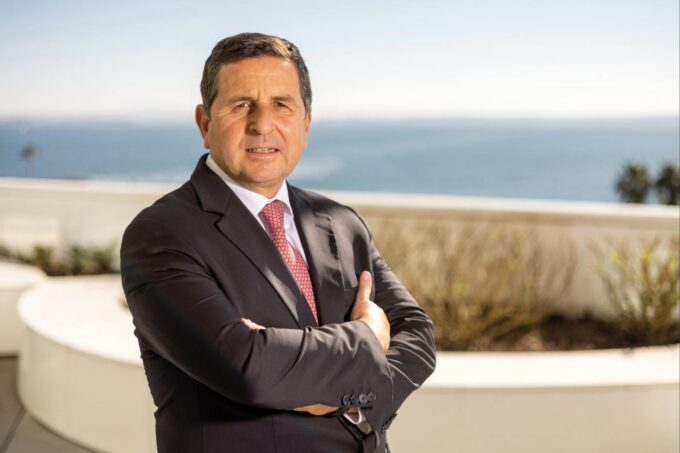
The AI productivity illusion
Confusing efficiency with productivity is to mistake speed for direction, and execution for value. Hamilton Mann explains how to avoid the pitfalls in your AI transformation...
Audio available

by Peter Vogel, Simon J. Evenett Published October 8, 2025 in Family business • 12 min read • 
Family-run businesses grow stronger with age, enabling them to withstand any passing storm. Image:
Johannes Plenio/PexelsExecutives today face intensifying geopolitical rivalry, threatened organizational solidarity, and a pushback against sustainability, creating fear and stalling success. It’s the same for family businesses, but what distinguishes them is their ability to survive these short-term pressures time and time again.
While most businesses work to a three to five-year strategy, families plan to keep their legacy alive across generations. As the saying goes: “A quarter in a family business is 25 years, not three months.” This long-term orientation, paired with an owner’s mindset, systemic resilience, and survival instinct forms the basis of a crisis management strategy that is universally applicable. Here, we present lessons for executives to navigate pervasive uncertainty like a family business.
Enterprising families are not sitting around dining tables, fretting over tariffs or retaliatory measures. Their focus is to preserve wealth, legacy, reputation, and family; their end is essentially indefinite, and they have more at stake than financial capital alone. Survival is an imperative that drives decision-making.
Many family businesses we know and work with have faced multiple near-death experiences. Their continued rise is not only a story about surviving short-term social shocks, technological disruption, and geopolitical uncertainty, but also one of extreme resilience achieved through long-term orientation, survival instinct, and knowledge passed down through generations. It’s what gives them the wisdom to navigate the next storm.
Take the José de Mello Group, one of Portugal’s oldest and most successful family-run firms, and the 2024 IMD Global Family Business Award winner. The enterprise has proven its resilience and adaptability in the face of uncertainty. It has established an exceptional system in terms of family and ownership governance and organizational discipline, which have been key factors in ensuring the family’s long-term vision.
Alfredo da Silva founded CUF Group in 1898, which started with chemicals and quickly diversified into textiles, ship repair, shipping, tobacco, banking, and insurance. Its motto was, “What the country doesn’t have, CUF creates it,” and the group grew exponentially. The company peaked in the 1970s, employing over 100,000 people and accounting for almost 5% of Portugal’s GDP. Then disaster struck. More than 180 companies in the group were nationalized in the wake of the 1974 revolution, and the family was forced to flee. They lost a significant part of their heritage and wealth, but that was far from the end of the story.
Da Silva’s grandson, José Manuel de Mello, then 47, and his wife, Mafalda, relocated to Switzerland with their 12 children. They reconstructed the group from scratch through industrial acquisitions in different sectors in Portugal, leveraging its international reputation, banking credit, and entrepreneurial spirit. De Mello never lost his commitment to Portugal and returned to rebuild the business and the country as soon as he could, buying a bank and an insurance company. A holding company was created, trading under the name José de Mello. The episode shows the pivotal role family firms can play in the community, the nation, and the world. No matter the challenge – revolution, war, sanctions, fire, or flood – multi-generational families have ingredients that put them at a strategic advantage.
Family-owned enterprises take an exceptionally long-term view; everything in the interim is considered noise, including tariffs. This patient capital mindset distinguishes family-controlled enterprises from their peers. They are the most financially prudent and agile and can change direction and pace quickly, but they rarely do so. Instead, family firms are led by an owner’s DNA that creates a purposeful, aligned, and committed vision. An evolution of the founder’s mindset, it ensures every decision takes total family wealth into account, carefully considering its reputational, intellectual, human, and social capital, as well as the balance sheet.
A 2016 study by Purdue’s Krannert School of Management found that companies in the S&P 500 where the founder is still CEO were more innovative. They generated 31% more patents, created more valuable patents, and were more likely to make bold investments to renew and adapt the business model. Similarly, Bain & Company developed a database of all public companies in the global stock markets and tracked their performance over 25 years. They found that the companies most successful at maintaining profitable growth over the long term were overwhelmingly companies where the founder was still running the business or involved in the board of directors. Importantly, it also included companies where the focus and principles of its founder endured.
This is a lesson from the family business playbook. Families run their firms as value-led organizations. Driven to create a legacy, make an impact, and unite the family, they consistently find ways to instill their values into their broader family, often considering future generations not yet born to ensure their legacy lives on. A family constitution is one example, a living document for current and future generations to use as a roadmap for success. Typically, it includes the family story, their heritage, values, strategic goals, and rules and processes that clarify family involvement in the business, as well as ambitions for the family, their businesses, and communities. Many other governance mechanisms ensure the owner’s DNA can be found in family firms for generations after their foundation. They include family councils, assemblies, and boards, which are charged with maintaining values and direction, educating the next generation, and offering a broader forum for family members to be heard.

Many of these structures include parameters for hiring, ensuring that future employees align with the firm’s long-term objectives, decision-making, compensation, and family philosophies. This often includes aligning personal and political opinions on matters that would otherwise not be discussed. Many non-family firms are adopting a “leave your passports at the door” policy as tensions over geopolitical issues rise within their leadership teams. In contrast, family firms continue to thrive, already boasting a loyal, committed, and aligned team.
Family firms look for competency in new hires, but critically, they also look for “culture fit” – the ability to fit in with the family’s values as well as their business. This could be through psychometric or personality testing of candidates or simply understanding which type of culture exists within the firm and working to find the skills, characteristics, and behaviors to complement it. Without an anchor shareholder, most non-family businesses do not have the same stakeholders to answer to as family businesses, nor do they face public scrutiny in the same way, so the same rules do not apply.
That said, executives in non-family firms can lean on the art of culture fit and focus on defining their organizational culture, ensuring it is set up in a way that harnesses creativity and embraces agility. In this way, you will ensure you have the right skills and capabilities to navigate uncertainty and make impactful change.
These executives must be incentivized and rewarded for longevity and alignment. In family firms, this often takes the form of long-term incentive plans (LTIPs), which include anything from stock options to deferred loans. A key marker of success in a founder-led organization is that the leader has skin in the game, and in family firms, the staff often do too. This means every decision is strategic and purposeful. Beyond financials, executives must be given the freedom and autonomy to make decisions (and mistakes) and the opportunity to learn, upskill, and develop. The benefits are vast for the firm and the individual who will return with increased skills and loyalty.
Family firms are immensely loyal, at times to their disadvantage. On average, they will have more employees on their payroll compared to their non-family peers, and in times of crisis, they are less likely to lay off employees. In return, family firms benefit from their employees’ loyalty in times of uncertainty.
Not every business can start again like the José de Mello Group. You need strength, resilience, entrepreneurial drive, vision, and financial slack.
Family firms have structural agility and less debt. They are financially more prudent and sit on more liquidity and equity, which helps them navigate moments of crisis. This is not a tangible takeaway for every business, as cash flow and stakeholders differ from firm to firm. However, the checks and balances appended to the agility we see in family businesses can be dissected.
Business leaders in family firms can make instant decisions, and their agility, when required, is critical for success. However, quick decisions are only good when they are the right call: agility must be accompanied by a robust selection of governance mechanisms and skilled specialists with the emotional intelligence and courage needed to say no to poor decisions. Diversity of thought is as critical as agility, and firms must distinguish between alignment of values and mirror-image hiring to ensure it is achieved.
The knowledge, understanding, and wisdom that family members have before joining the business is another key differentiator. Wisdom is passed down through the generations, and the next one is raised with systematic storytelling to ensure they are fully aware of past successes and failures on which they can build and develop.
In contrast, leaders inducted into non-family firms typically receive a handover, a copy of the balance sheet, and a list of strategic ambitions for the year ahead. Values, history, philosophy, and best practices are almost always learned on the go.
In family enterprises, future leaders have been raised on stories of uncertainty and tales of resilience. From a young age, they have been listening to senior leaders and relatives navigate crises in an entrepreneurial way. So, family members joining the enterprise already have an ingrained knowledge of the business, relationships with trusted advisors and stakeholders, and, often, a vested interest in the firm’s success. In sophisticated family ecosystems, next-generation leaders would have observed or participated in critical decision-making activities (e.g., acting as a board observer at a comparatively young age) to broaden their financial literacy and commercial acumen.
The survival instinct we opened with is another hand-me-down: a repeated message that we must survive, mistakes can be made and lessons learned from, but failure is not an option. Many academics call this organizational fortitude.
This exceptional wisdom, cultural awareness, and interest can be replicated in public firms with a carefully curated onboarding program, company handbook, embedded organizational values, and internal communications strategy that keeps employees educated and engaged.

“Family-owned enterprises take an exceptionally long-term view; everything in the interim is considered noise, including tariffs. ”
What if businesses shifted their focus on uncertainty from a negative to a central pillar of their strategy? Drawing from the specific practices of resilient family enterprises, here are six actionable steps for non-family firms:
Implement decades-long strategy development alongside quarterly reporting. Establish a dedicated long-term strategy committee that meets quarterly to assess decisions through a generational lens. This doesn’t replace short-term planning but creates a parallel framework where major strategic decisions are evaluated for their impact over decades, not just fiscal years. Board compensation and executive incentives should include metrics tied to these extended time horizons.
The benefit: Extended time horizons transform short-term volatility into strategic noise. When decisions are evaluated across decades, temporary disruptions like tariffs, regulatory changes, or market corrections become manageable variations rather than existential threats. This approach enables leaders to maintain strategic direction during turbulent periods instead of reactive pivoting.
Create structured knowledge transfer protocols that capture both successes and failures. Unlike family businesses, where wisdom passes through dinner table conversations, public companies need formal mechanisms. Establish “legacy interviews” with departing senior executives, maintain accessible case study databases of past crises and responses, and require incoming leaders to complete comprehensive organizational history modules before assuming key roles.
The benefit: Institutional memory provides crisis navigation templates. When new uncertainties emerge, leaders can reference how the organization previously handled analogous situations, reducing decision paralysis and avoiding repeated mistakes. This accumulated wisdom accelerates response times and improves the quality of decision-making during unfamiliar circumstances.
Restructure compensation packages to mirror the “skin in the game” dynamics of family businesses. Implement mandatory long-term equity positions that cannot be sold for 5-7 years post-departure, create deferred compensation pools tied to company performance over extended periods, and establish “survival bonuses” that reward executives for maintaining organizational resilience through multiple economic cycles rather than maximizing short-term returns.
The benefit: Aligned incentives eliminate the temptation to pursue short-term gains that increase long-term vulnerability. When executive wealth is tied to sustained organizational health, leaders naturally prioritize decisions that enhance adaptability and resilience over those that optimize immediate financial metrics but weaken the company’s ability to weather future storms.
Adopt the family business approach to balance sheet strength. Maintain higher cash reserves than typically recommended by financial optimization models, establish committed credit facilities that remain unused except during genuine crises, and resist the pressure to leverage balance sheets to their theoretical maximum. This “patient capital” approach provides the financial flexibility that enables rapid decision-making during uncertainty.
The benefit: Financial buffers convert uncertainty from an existential threat into a strategic opportunity. Strong balance sheets enable companies to make counter-cyclical investments, acquire distressed competitors, or pivot business models when others cannot. More importantly, financial strength prevents uncertainty from forcing suboptimal decisions driven by liquidity constraints rather than strategic logic.
Develop governance structures that preserve organizational DNA across leadership transitions. Create a “company constitution” similar to family constitutions, establishing non-negotiable core principles and decision-making frameworks. Form a cultural stewardship committee with rotating membership that monitors adherence to these principles and has the authority to challenge strategic decisions that conflict with established values. This ensures continuity beyond individual leaders.
The benefit: Cultural continuity reinforces stable decision-making frameworks when external conditions are unstable. Clear organizational principles reduce internal debate and conflict during crises, enabling faster responses. When employees understand core values and decision criteria, they can act autonomously during uncertain periods without requiring constant top-down direction, improving organizational responsiveness.
Build local reputational capital as a strategic asset. Family businesses survive crises partly because of deep community relationships that provide support networks and local goodwill. Public companies should systematically invest in becoming integral parts of their operating communities through local hiring preferences, supply chain partnerships, and community development initiatives that create mutual dependence and support during difficulties.
The benefit: Strong stakeholder relationships contribute to early warning systems and support networks during crises. Local communities, suppliers, and employees become allies who provide information, flexibility, and support when external pressures mount. These relationships also create switching costs for stakeholders, making them less likely to abandon the company during temporary difficulties, providing much-needed stability during uncertain periods.
These adaptations require boards and executives to accept moderately lower short-term financial optimization in exchange for significantly enhanced long-term survival probability and crisis resilience. Indeed, our current era of intensifying geopolitical rivalry and system-wide disruption necessitates a fundamental reconsideration of corporate purpose – shifting from maximizing quarterly returns to ensuring institutional survival and the ability to sustain service to customers year-in and year-out.

Professor of Family Business and Entrepreneurship at IMD
Peter Vogel is Professor of Family Business and Entrepreneurship, Director of the Global Family Business Center (GFBC), and Debiopharm Chair for Family Philanthropy at IMD, where he leads the Leading the Family Business, Leading the Family Office, and Lean Intrapreneurship programs. He is recognized globally as one of the foremost family business educators, advisors, and academics, and has received numerous awards and distinctions. He is the author of the award-winning books Family Philanthropy Navigator and Family Office Navigator.

Professor of Geopolitics and Strategy at IMD
Simon J. Evenett is Professor of Geopolitics and Strategy at IMD and a leading expert on trade, investment, and global business dynamics. With nearly 30 years of experience, he has advised executives and guided students in navigating significant shifts in the global economy. In 2023, he was appointed Co-Chair of the World Economic Forum’s Global Future Council on Trade and Investment.
Evenett founded the St Gallen Endowment for Prosperity Through Trade, which oversees key initiatives like the Global Trade Alert and Digital Policy Alert. His research focuses on trade policy, geopolitical rivalry, and industrial policy, with over 250 publications. He has held academic positions at the University of St. Gallen, Oxford University, and Johns Hopkins University.

January 26, 2026 • by Hamilton Mann in Audio articles
Confusing efficiency with productivity is to mistake speed for direction, and execution for value. Hamilton Mann explains how to avoid the pitfalls in your AI transformation...
 Audio available
Audio available
January 22, 2026 • by Shelley Zalis in Audio articles
Multigenerational teams bring competitive advantages. It’s vital to tap into the wisdom and experience of older workers, urges Shelley Zalis....
 Audio available
Audio available
January 21, 2026 • by Rupa Dash in Audio articles
As women live longer, society must rethink careers and leadership to unlock a longevity-equality dividend that enables women to contribute and lead at every life stage....
 Audio available
Audio available
January 16, 2026 • by Jørgen Vig Knudstorp in Audio articles
Real influence in the boardroom comes not from power or persuasion, but from humility, clarity, and the courage to disagree, says Jørgen Vig Knudstorp...
 Audio available
Audio availableExplore first person business intelligence from top minds curated for a global executive audience